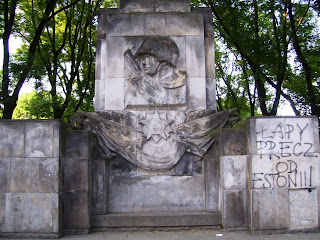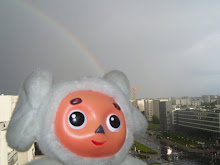We Americans basically view WWII as something that happened a long time ago. Most people think everything has past, and most Americans can't even remember the good 'ol CCCP, nor have they realized that it collapsed not too long ago. In their view, all it did was provide a wealth of nifty retro t-shirts. We're friends with Germans, we're friends with Russians, and many Russians come and work for the summer (Hi, Galina!!!)
However, here the past is very much alive. Apparently it's very much alive in the rest of Europe as well. The Poles still remain bitter towards the Germans, if for nothing else than their (German) leading role in the EU. The Poles also don't have warm feelings towards their Slavic brothers, the Russians. Never have. They didn't when the Polish troops set up a puppet Czar, and they didn't when the Russians set up a puppet Polish President. (In fact, I get the general feeling that the Poles really only like the Czechs; the Ukrainians are iffy, and I don't know about the Byelorussians.) So, while we go, "But that was so looooonngggg ago. Get over it. I mean, we're pals with the Brits." the Poles have a more brooding resentment. Well, I guess it's like the South. You know how the past painfully comes alive and people still haven't gotten over Appomattox? Well, Europeans still haven't gotten over 1939-1945. That's a lie, the Germans have, but the French haven't and the Irish never cared.
It also doesn't help that several cities, which are historically Polish are now in the hands of Lithuania (Vilnius), Belarus (Brest), and Ukraine (Lwów.) It's kind of like how Koenigsberg (Kaliningrad) is historically Prussian (German) but Russia saw fit to annex it. Much like how Hawaii was a small kingdom and then, somehow, became a state.

Paws off Estonia!!!
NOTE: I really hope there's not some sort of professor reading this and pointing out flaws that may have manifested in my recollections of the research/reading I've done.
There are signs that Poland is moving forward and that they are moving on. People seem to care less that the former President, who declared martial law in 1981, is going on trial. They are turning their attention to the 2012 Euro Cup, and are hoping to avoid a major embarrassment. Poles still feel a slight twinge when remembering their lost territory, but most of them wisely say that it's not worth trying to get it back. They point out that Germany has just as much claim to Poland's western cities (which were given to Poland after WWII) such as Szczeczin (Stettin) and Wroclaw (Breslau) and since these cities are important to industry, it would be hard to give them back. Also, since the Poles were all expelled from the Soviet-annexed cities, there's no Polish population left to demand a union with Poland (unlike in Northern Ireland, where there is a sizable Catholic minority that desires a united Ireland.)

One can see that someone tried to chisel away the sickle and hammer.
They haven't taken the step of removing the monuments to the Soviet Soldiers, like Estonia did (and caused quite a ruckus.) But, the monuments are in disrepair and largely ignored. (For instance, many monuments to heroes of the Warsaw Uprising, and others such as Gen. Pilsudski are often laden with fresh flowers and are vandalism free.) Warsaw has gobs of monuments. Monuments to every Pole who ever made a name for himself, and many more to non-Poles. They have a monument for George Washington (Jerzy Waszington) as well as a major artery named after him. It surprised me, since First and Foremost probably didn't do jack-diddly for Poland. (The US had the first modern constitution and Poland had the second.)






3 comments:
Interesting about History being important in Poland. I think many people in the US do not know very much history because we traditionally impose history on others (cultural and military imperialism) and have never fought a war on our country's mainland, unless you count the "war" of 1812. Also because the only thing usually taught in high-school history in the US is a lot of dates. Good thing I had Mr. P for US history. What do you think of my theory?
I do think it has to do with not as much fighting on our soil as theirs; however, we have made peace with our neighbors like Mexico and Canada (after invading them a couple of times.) But we still do have strong some strong memories like Pearl Harbor and the Alamo, but we've generally forgiven both the Mexicans and the Japanese.
I don't think their history teaching is very much different from ours (from technique the technique standpoint, not the interpretations standpoint.) I think they learn more dates than we do, and they're beaten into them. But I also think that they can see the effects more readily about them. So the fleet was destroyed in Pearl Harbor (well, part of it): it was rebuilt. Many people here still see the gray communist buildings and know of families that were uprooted and torn apart, etc. Thus the effects are still longstanding.
Also, the more I think about it, the more that I think that my (or our) teachers from high school were full of horseshit and quite biased. (Mr. Puglisi is not excused, although I respect him somewhat.)
My first case is the conquering of the New World by the Spanish. It came off, at least to me, that they were trying to portray the Indians as peace-loving tree huggers and Spanish as ruthless, hateful people who loved nothing more than gold and power (which is partly true.) The Native Americans were no kind people, especially the Aztecs and Incans who had formidable empires and killed quite a lot of people to gain them. One must ask himself, if the tables were turned, if the Indians had invaded the Old World, would they have done the same thing? Most likely, yes.
Post a Comment